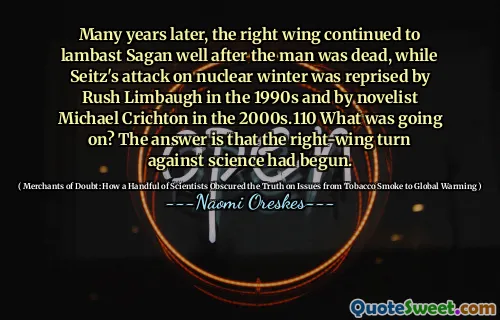Naomi Oreskes is a prominent historian of science whose work often focuses on the intersection of science, policy, and public perception. She is particularly known for her research on the consensus among climate scientists regarding human-caused climate change and the ways in which this consensus has been misrepresented in public discourse. Her book "Merchants of Doubt," co-authored with Erik M. Conway, explores how a small group of scientists and industry representatives have cast doubt on scientific findings related to various issues, including climate change. Oreskes argues that this misinformation campaign has significant implications for public understanding and policy decision-making. By analyzing historical examples, she highlights the tactics used to undermine scientific consensus and the role of corporate interests in shaping public debates. Her work stresses the importance of scientific integrity and the responsibility of scientists to communicate their findings clearly to policymakers and the public. In addition to her scholarly work, Oreskes is a passionate advocate for science communication and education. She emphasizes that understanding the science behind climate change is crucial for making informed decisions about environmental policy. Through her research, writing, and public speaking, she continues to address the challenges posed by misinformation and advocates for the importance of listening to scientific expertise in the face of global challenges.
Naomi Oreskes is a noted historian of science who delves into topics related to science policy and public understanding of science. Her research sheds light on the consensus among climate scientists regarding anthropogenic climate change and the distortions that often arise in public discussions.
Her influential book "Merchants of Doubt," co-authored with Erik M. Conway, investigates how a minority of scientists have worked to sow skepticism about scientific findings on critical issues, particularly climate change. Oreskes argues that this deliberate misinformation has dangerous consequences for how science informs policy and public opinion.
Oreskes advocates for clearer science communication and emphasizes the need for responsible science advocacy. She believes that a well-informed public is essential for addressing pressing issues like climate change, and her work consistently aims to bridge the gap between scientific knowledge and public policy.
More »
Today Birthdays
1896 -
John Dos Passos
1960 -
Edward St Aubyn
1925 -
Yukio Mishima
1875 -
Albert Schweitzer
1919 -
Andy Rooney
1952 -
Maureen Dowd
1957 -
Anchee Min
1969 -
Dave Grohl
1988 -
Tom Rosenthal
1913 -
Tillie Olsen
1949 -
Lawrence Kasdan
1920 -
George Herman
1801 -
Jane Welsh Carlyle
1969 -
Jason Bateman
1892 -
Hal Roach
1941 -
Faye Dunaway
1968 -
LL Cool J
1982 -
Aaron Koblin
1943 -
Shannon Lucid
1940 -
Trevor Nunn
1942 -
Carol Bellamy
1978 -
Kuno Becker
1977 -
Yandel
1948 -
Carl Weathers
1947 -
Bev Perdue
1981 -
Trieste Kelly Dunn
